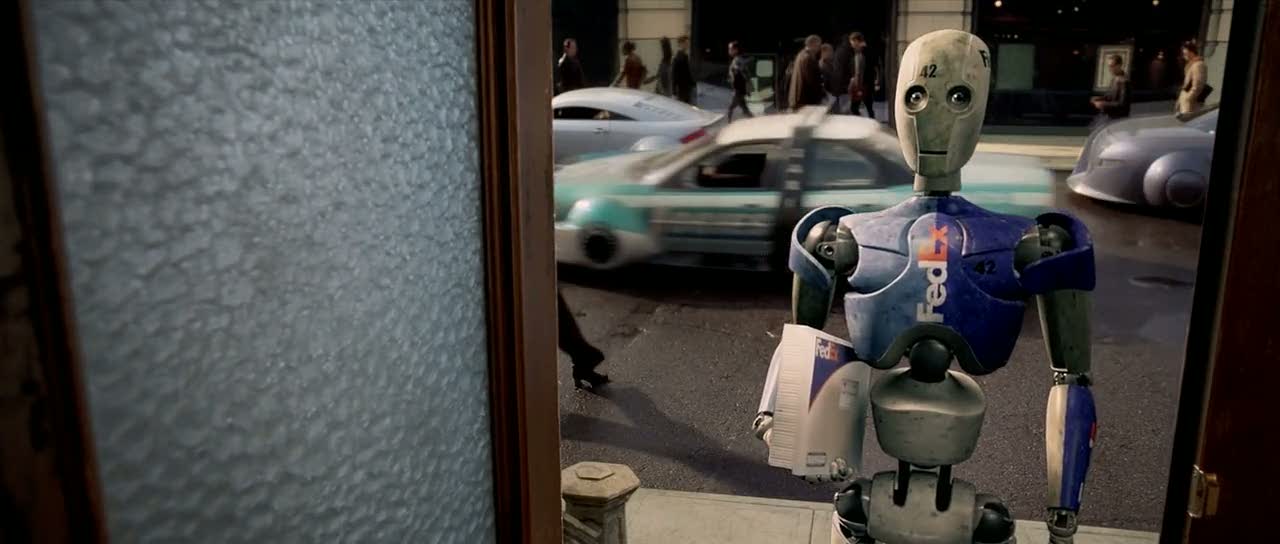I, Robot, Wear Converse
What if we as humans were completely dependent on robots? Set in the near-futuristic world of 2035 A.D., I, Robot launches this scenario. Robots are now used to go out and buy groceries, drive cars, clean houses, deliver mail: basically anything to help make our human lives a little easier. But are humans becoming too dependent on these nonhuman fabrications? Chicago Police Detective Del Spooner, played by Will Smith, suspects that we are. He isn't fond of the robots, and he lets everyone know it. Several times throughout the film, his family, friends, and co-workers challenge the negative view he holds towards the recent technological advances. Spooner's personal beliefs start to materialize when a certain robot, named Sonny, seems to violate the Three Laws of Robotics. If this is true, then there is really nothing stopping each and every robot from utilizing its free will to take over the world.
 The film as a whole creates an atmosphere that shrouds us viewers in brand names. The first and most obvious placement of branding in the film occurs on the robots themselves. As pictured to the left, this robot serves as a FedEx guy. The film creates an argument here for the company, mainly along the lines of ethos. FedEx is given credibility because the robots were made specifically to be a high-tech, efficient, and cost-effective creation of the future. Since we as viewers see one of the robots wearing the FedEx uniform, we can make a correlation between the two, and assume that FedEx is efficient and labor-saving as well. This is a ultimately a good thing for the brand.
The film as a whole creates an atmosphere that shrouds us viewers in brand names. The first and most obvious placement of branding in the film occurs on the robots themselves. As pictured to the left, this robot serves as a FedEx guy. The film creates an argument here for the company, mainly along the lines of ethos. FedEx is given credibility because the robots were made specifically to be a high-tech, efficient, and cost-effective creation of the future. Since we as viewers see one of the robots wearing the FedEx uniform, we can make a correlation between the two, and assume that FedEx is efficient and labor-saving as well. This is a ultimately a good thing for the brand. In addition to FedEx, the image to the left lists A TON of other brands showcased in the film: JVC, Prudential, Ovaltine, Dos Equis, etc. One that I'd like to focus on for a second is Audi. The car that Spooner drives in the film is noticeably an Audi, and this gives the car recognition as well as the impression that it is "the car of the future." To put it plainly, the car is sweet. It is luxurious and sophisticated. This speaks well for logos. Because the film is set in 2035, it basically says that Audi cars will be the car to drive in the future because they are luxurious and sophisticated. It is logical to imply this because we as a society are fast-growing. We are technologically-savvy and who knows what we could come up with 25 years from now?
In addition to FedEx, the image to the left lists A TON of other brands showcased in the film: JVC, Prudential, Ovaltine, Dos Equis, etc. One that I'd like to focus on for a second is Audi. The car that Spooner drives in the film is noticeably an Audi, and this gives the car recognition as well as the impression that it is "the car of the future." To put it plainly, the car is sweet. It is luxurious and sophisticated. This speaks well for logos. Because the film is set in 2035, it basically says that Audi cars will be the car to drive in the future because they are luxurious and sophisticated. It is logical to imply this because we as a society are fast-growing. We are technologically-savvy and who knows what we could come up with 25 years from now?The last, and in my opinion, most significant, product placement is that of Converse Chuck Taylor's All-Stars. Spooner is shown rocking the shoes pretty early on in the movie. Thereafter, several references are made, as seen in the video below. When he first puts on the shoes, there are a lot of camera angles, they zoom in on the product, they make sure they're fresh and lookin' good. In ADVERTISING; Name-brand props in the movies; Consumer group wants labels to signify product placement: Martin Smith explains that "most placements really flatter the product. In most, the product appears like the full moon, the label always facing the camera. They hover there in an almost beautiful way. Also, they're associated whenever possible with sympathetic characters." This idea totally rings true for the shoes. A scene worth several seconds is dedicated solely to him taking the shoes out of their box and putting them on!
In addition, in the background of the scene, "superstition" by Stevie Wonder is playing. This has a lot of meaning for the context of the film. The song itself discusses the looming threat of society's downfall (because it was written in the urban atmosphere of the early 70s, where government was mistrusted and outsiders threatened national security). Despite all the chaos, Stevie Wonder's singing is upbeat; he addresses social problems in a way that is feelgood and carefree. From the video, I feel that this is Spooner's attitude. He knows that something bad is coming for the world, but he says 'screw it' because he has his awesome Converse shoes. He even refers to them as "a thing of beauty." This puts the brand in a very good light. On the other hand, it does come across to me like the film is trying a little too hard to put the brand out there. "The spread of product placement has helped make the movies less and less coherent as narrative and less challenging as visions of reality. The overwhelming presence of these logos and images contribute to the trivialization of cinema." (Smith, E03) So, some people may argue in this case that the scene isn't relevant simply because the film puts SO many other 'advertisements' out there that it's just too overbearing. This may be true to a certain extent, but the fact is that I, Robot all in all uses product placement to a degree of success. It does so because we notice the brands; we notice them, and for most of them, we already have a preconceived notion of a brand's stereotype; so if we see them in the film and that (hopefully good) steretyope is reinforced, isn't that the main goal of putting the brand there in the first place?
In the following dialogue, Spooner's grandma jokes about the shoes, to which he replies: "I know you want some, all you gotta do is ask!" The exchange is funny because Spooner says the shoes are 'Vintage 2004' which is, in actuality, only a few years before the film was made. However, the comment makes sense because the film is supposed to be set in 2035. So the major implication here is that years and years from now into the future, the shoes will be considered a classic. They will be worn by people who remember the year when the high-quality brand was produced. This, I believe, has a huge effect on how people look at the shoes. It favorably gives Converse pathos because people feel for a time when things were good; people recall their childhoods, and the shoes that they wore as kids. In terms of the present, I feel like the audience for this film was geared towards mostly teenagers, which also means that they would be most likely to wear the shoes.
In the final seconds of the video, Spooner's boss, Lt. John Bergin, makes a comment about the shoes. During the snippet, though short, we can tell that the lieutenant is showing a painfully solemn facial expression. It's as if he's about to tell Spoon something gravely important. The music even picks up the tempo a little bit! But out of nowehere, all he says is "Nice Shoes..." as Spoon walks away. Because the scene is funny, I think that it works. The shoes are shown positively, and given more ethos because because the lieutenant is an important, professional man who has much credibility himself. Therefore, a wide range of people can all enjoy the Converse shoes.
I give I, Robot 4 pickles for effectively incorporating products into the film, and using all 3 appeals in doing so. I took away 1 pickle because the film pushes the limit with the amount of brand names it uses, which may take away from the overall effect it has.





No comments:
Post a Comment